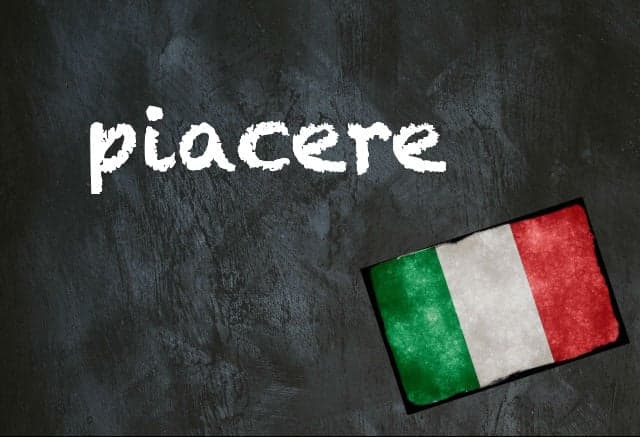Italian word of the day: 'Piacere'

It's a pleasure to get this word right.
How many beginners' Italian classes are devoted to piacere?
Click here to hear piacere pronounced:
It's not just that knowing how to say you 'like' something is crucial in any language. It's also because English speakers are sometimes tripped up by the fact that in Italian, you don't like things – they please you.
Once you get 'to like' out of your head and start to think of piacere as 'to please' or 'to be pleasing', it's actually pretty easy to use.

It's an intransitive verb (i.e., it doesn't have a direct object), which means two things: one, it needs an either an indirect object pronoun (mi, ti – 'to me', 'to you', etc) or the preposition a followed by the person you're specifying (a Pino – 'to Pino').
And two, it doesn't agree with the person you're talking about, but with the thing(s) – that's why you might see the plural form used even when there's only one person involved.
It may be a bit tricky to get your head round at first, but the upside is that most of the time you'll only need to remember two conjugations of piacere in whatever tense you're using: in the present, piace, 'something pleases', and piacciono, 'some things please'.
Il gelato piace a tutti.
Everybody likes gelato.
Le vacanze mi piacciono fatte in compagnia.
I like going on holiday with other people.
Here's how it looks in the present perfect (remember to use essere not avere, like with all intransitive verbs)...
Il cantante è piaciuto al pubblico.
The audience liked the singer.
Quali sono i film che vi sono piaciuti di più?
What films did you all like the most?
... and the present conditional.
Mi piacerebbe partire per una lunga vacanza.
I would like to set off on a long holiday.
Gli gnocchi sono buoni, ti piacerebbero.
The gnocchi are good, you'd like them.
Got it? Now let's move on to the other meanings of piacere that they don't tell you about in your first Italian class.

Aside from a verb, it's also a noun, spelled exactly the same way. It means, essentially, 'pleasure'.
Ho ascoltato il suo discorso con vivo piacere.
I listened to her speech with great pleasure.
Sono i semplici piaceri della vita che ci portano davvero felicità.
It's the simple pleasures in life that really make us happy.
You know how we say 'it's a pleasure to meet you' in English? You can say, simply, "piacere!" in Italian to mean the same thing.
– Ti presento mio fidanzato, Antonio.
– Piacere!
– Let me introduce you to my boyfriend, Antonio.
– Pleased to meet you!
But piacere can also mean something more like 'courtesy' or 'favour'.
Mi faresti un piacere?
Would you do me a favour?
You can say make a polite request by adding per piacere: just like per favore, it means 'please'. You're essentially asking someone to do something 'as a favour' to you.
Per piacere, vuoi dirmi che ora è?
Could you please tell me what time it is?
Even more formally, you can ask someone to 'do you the kindness' or 'be so kind as to' – "mi faccia il piacere?"
Mi faccia il piacere di aspettare qui.
Please be so kind as to wait here.
Though sometimes when Italians are this polite, they're just being sarcastic.
Mi faccia il piacere di tacere!
Would you please shut up!
In fact, just saying "ma mi faccia il piacere!" or "fammi il piacere!" in an exasperated tone is enough to make clear that you're fed up – a bit like exclaiming 'Do me a favour!'

There's one more useful phrase that features piacere, this time as a verb: mi piacerebbe, 'I wish', with the implication that something's not likely or possible.
Even better is ti piacerebbe, 'you wish' – or 'in your dreams'.

Do you have an Italian word you'd like us to feature? If so, please email us with your suggestion.
Comments
See Also
How many beginners' Italian classes are devoted to piacere?
It's not just that knowing how to say you 'like' something is crucial in any language. It's also because English speakers are sometimes tripped up by the fact that in Italian, you don't like things – they please you.
Once you get 'to like' out of your head and start to think of piacere as 'to please' or 'to be pleasing', it's actually pretty easy to use.

It's an intransitive verb (i.e., it doesn't have a direct object), which means two things: one, it needs an either an indirect object pronoun (mi, ti – 'to me', 'to you', etc) or the preposition a followed by the person you're specifying (a Pino – 'to Pino').
And two, it doesn't agree with the person you're talking about, but with the thing(s) – that's why you might see the plural form used even when there's only one person involved.
It may be a bit tricky to get your head round at first, but the upside is that most of the time you'll only need to remember two conjugations of piacere in whatever tense you're using: in the present, piace, 'something pleases', and piacciono, 'some things please'.
Il gelato piace a tutti.
Everybody likes gelato.
Le vacanze mi piacciono fatte in compagnia.
I like going on holiday with other people.
Here's how it looks in the present perfect (remember to use essere not avere, like with all intransitive verbs)...
Il cantante è piaciuto al pubblico.
The audience liked the singer.
Quali sono i film che vi sono piaciuti di più?
What films did you all like the most?
... and the present conditional.
Mi piacerebbe partire per una lunga vacanza.
I would like to set off on a long holiday.
Gli gnocchi sono buoni, ti piacerebbero.
The gnocchi are good, you'd like them.
Got it? Now let's move on to the other meanings of piacere that they don't tell you about in your first Italian class.

Aside from a verb, it's also a noun, spelled exactly the same way. It means, essentially, 'pleasure'.
Ho ascoltato il suo discorso con vivo piacere.
I listened to her speech with great pleasure.
Sono i semplici piaceri della vita che ci portano davvero felicità.
It's the simple pleasures in life that really make us happy.
You know how we say 'it's a pleasure to meet you' in English? You can say, simply, "piacere!" in Italian to mean the same thing.
– Ti presento mio fidanzato, Antonio.
– Piacere!
– Let me introduce you to my boyfriend, Antonio.
– Pleased to meet you!
But piacere can also mean something more like 'courtesy' or 'favour'.
Mi faresti un piacere?
Would you do me a favour?
You can say make a polite request by adding per piacere: just like per favore, it means 'please'. You're essentially asking someone to do something 'as a favour' to you.
Per piacere, vuoi dirmi che ora è?
Could you please tell me what time it is?
Even more formally, you can ask someone to 'do you the kindness' or 'be so kind as to' – "mi faccia il piacere?"
Mi faccia il piacere di aspettare qui.
Please be so kind as to wait here.
Though sometimes when Italians are this polite, they're just being sarcastic.
Mi faccia il piacere di tacere!
Would you please shut up!
In fact, just saying "ma mi faccia il piacere!" or "fammi il piacere!" in an exasperated tone is enough to make clear that you're fed up – a bit like exclaiming 'Do me a favour!'

There's one more useful phrase that features piacere, this time as a verb: mi piacerebbe, 'I wish', with the implication that something's not likely or possible.
Even better is ti piacerebbe, 'you wish' – or 'in your dreams'.

Do you have an Italian word you'd like us to feature? If so, please email us with your suggestion.

Join the conversation in our comments section below. Share your own views and experience and if you have a question or suggestion for our journalists then email us at [email protected].
Please keep comments civil, constructive and on topic – and make sure to read our terms of use before getting involved.
Please log in here to leave a comment.